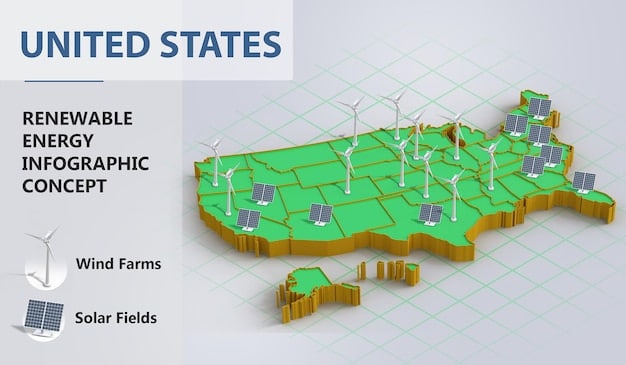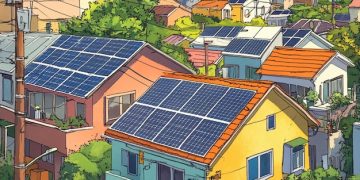Renewable Energy Jobs in the US: Opportunities & Growth to 2030

Understanding the Projected 15% Increase in US Renewable Energy Jobs by 2030 involves analyzing market trends, governmental policies, technological advancements, and available training programs that cater to the expanding green economy in the United States.
The United States is witnessing a significant shift towards renewable energy, creating a surge in job opportunities. Understanding the Projected 15% Increase in US Renewable Energy Jobs by 2030: Opportunities and Training Programs entails not only knowing where these jobs are but also how to prepare for them with the right skills and knowledge.
Renewable Energy Sector Growth in the US
The renewable energy sector in the United States is experiencing unprecedented growth, driven by factors such as environmental concerns, government incentives, and technological advancements. This section delves into the key drivers behind this growth and what it means for the job market.
Factors Driving Renewable Energy Growth
Several factors contribute to the rapid expansion of the renewable energy sector in the US, making it a promising area for job seekers.
- Government Policies: Federal and state incentives, tax credits, and mandates supporting renewable energy projects.
- Environmental Awareness: Increasing public concern about climate change and the desire for sustainable energy sources.
- Technological Advancements: Continuous innovation in solar, wind, and other renewable technologies, improving efficiency and reducing costs.
- Economic Benefits: Cost-competitiveness of renewable energy compared to fossil fuels, making it an attractive investment.

Impact on the Job Market
The growth of the renewable energy sector directly translates into a significant increase in job opportunities across various fields.
- Increased Demand: Growing need for skilled workers in installation, maintenance, and manufacturing of renewable energy systems.
- New Job Creation: Emergence of new roles in areas like energy storage, smart grids, and renewable energy project development.
- Economic Development: Renewable energy projects stimulating local economies through job creation and investment.
In conclusion, the renewable energy sector’s expansion in the US is fueled by policy support, environmental awareness, technological progress, and economic advantages, leading to considerable job market growth and new economic opportunities.
Key Renewable Energy Sectors and Job Opportunities
Various renewable energy sectors are contributing to the overall job growth in the US. This section highlights the key sectors and the types of job opportunities they offer.
Solar Energy
Solar energy is one of the fastest-growing renewable energy sectors, creating numerous job opportunities in installation, maintenance, and manufacturing.
- Solar Panel Installers: Professionals responsible for installing and maintaining solar panels on residential and commercial buildings.
- Solar Engineers: Engineers specializing in the design, development, and optimization of solar energy systems.
- Sales and Marketing: Roles focused on promoting and selling solar energy solutions to customers.
Wind Energy
The wind energy sector is another significant employer, with opportunities in turbine manufacturing, installation, and maintenance.
- Wind Turbine Technicians: Skilled technicians who install, maintain, and repair wind turbines.
- Wind Energy Engineers: Engineers who design and develop wind energy projects and improve turbine technology.
- Project Developers: Professionals who manage the planning, financing, and construction of wind energy farms.

Other Renewable Energy Sectors
Beyond solar and wind, other renewable energy sectors also offer promising job opportunities.
- Hydroelectric Power: Jobs in the operation and maintenance of hydroelectric power plants.
- Biomass Energy: Positions in the production and processing of biomass for energy generation.
- Geothermal Energy: Opportunities in the exploration, development, and operation of geothermal energy resources.
In summary, the solar, wind, and other renewable energy sectors provide diverse and growing job opportunities, spanning from installation and maintenance to engineering and project development, catering to a wide range of skills and expertise.
Skills in Demand for Renewable Energy Jobs
Entering the renewable energy job market requires specific skills and qualifications. This section outlines the essential skills in demand and how to acquire them.
Technical Skills
Technical skills are crucial for many roles in the renewable energy sector, ensuring the efficient and safe operation of renewable energy systems.
Technical proficiency is Paramount in effectively installing, maintaining, and repairing renewable energy systems.
- Electrical Knowledge: Understanding of electrical systems and components relevant to renewable energy technologies.
- Mechanical Skills: Expertise in mechanical systems and equipment used in renewable energy projects.
- Data Analysis: Ability to analyze data to optimize the performance of renewable energy systems.
Soft Skills
In addition to technical skills, soft skills are essential for teamwork, communication, and problem-solving in the renewable energy sector.
Teamwork is very important in the current renewable energy sector, allowing for more streamlined and collaborative work efforts.
- Communication: Effective communication skills for collaborating with colleagues, clients, and stakeholders.
- Problem-Solving: Ability to identify and resolve technical and logistical challenges in renewable energy projects.
- Project Management: Skills in planning, organizing, and executing renewable energy projects effectively.
Combining technical expertise with strong soft skills enhances career prospects for workers in a variety of sectors.
Training and Education Programs for Renewable Energy Careers
To prepare for a career in renewable energy, it’s essential to pursue relevant education and training programs. This section provides an overview of available programs and certifications.
Vocational Training Programs
Vocational training programs offer hands-on skills and practical knowledge for specific roles in the renewable energy sector.
In summary, vocational training programs present opportunities for practical skills development and specific job roles.
- Solar Panel Installation Training: Programs that teach the basics of installation, maintenance, and repair of solar modules and components.
- Wind Turbine Technician Training: Courses that cover fundamental turbine maintenance, repair, and operations procedures.
- Electrical Safety Training: Programs that offer industry-relevant health and safety training, like OSHA 30.
Higher Education Programs
Higher education programs provide advanced knowledge and research opportunities in renewable energy technologies and related fields.
In summary, the programs for higher education encompass advanced research opportunities and specialized training.
- Renewable Energy Degrees: Bachelor’s and master’s degrees in renewable energy engineering, science, or technology management.
- Engineering Programs: Specializations in electrical, mechanical, or environmental engineering with a focus on renewable energy.
- Research Opportunities: Involvement in research projects focused on advancing renewable energy technologies.
In summation, renewable careers and education programs are essential with increasing demand for workers.
Government and Industry Initiatives Supporting Renewable Energy Jobs
Various government and industry initiatives are in place to support the growth of renewable energy jobs in the US. This section explores some of these initiatives.
Government Initiatives
Government initiatives play a significant role in driving the development and expansion of the renewable energy sector.
Government initiatives help contribute to the expansion of the renewable energy industry.
- Tax Credits and Incentives: Federal and state tax credits for renewable energy projects, encouraging investment and job creation.
- Funding for Research and Development: Government funding for research and development of new renewable energy technologies.
- Workforce Development Programs: Initiatives aimed at training and upskilling workers for renewable energy jobs.
Industry Initiatives
Industry initiatives also contribute to the growth of renewable energy jobs through various programs and collaborations.
Industry initiatives are essential for support for the growth of renewable jobs through collaboration efforts.
- Partnerships with Educational Institutions: Collaborations between renewable energy companies and universities to develop training programs.
- Internship Programs: Opportunities for students and graduates to gain practical experience in the renewable energy sector.
- Industry Associations: Organizations that advocate for policies supporting renewable energy and provide resources for job seekers.
In conclusion, government and industry initiatives are accelerating the support and expansion of the renewable energy industry.
Future Trends and Long-Term Prospects for Renewable Energy Jobs
The renewable energy sector is expected to continue growing in the coming years, driven by technological advancements and policy support. This section explores the future trends and long-term prospects for renewable energy jobs.
Technological Advancements
Continuous technological advancements promise to further enhance the efficiency and cost-effectiveness of renewable energy systems.
Improvements in technology can create more accessible options for Renewable energy projects.
- Energy Storage: Development of advanced energy storage solutions to address the intermittency of renewable energy sources.
- Smart Grids: Implementation of smart grid technologies to improve the reliability and efficiency of electricity distribution.
- Digitalization: Use of data analytics and artificial intelligence to optimize the performance of renewable energy systems.
Policy Support
Supportive government policies and regulations will continue to drive the growth of the renewable energy sector and create job opportunities.
Renewable sectors require policy support to grow and create job opportunities for people of all skill levels.
- Renewable Energy Mandates: State and federal mandates requiring a certain percentage of electricity to come from renewable sources.
- Carbon Pricing: Implementation of carbon pricing mechanisms to incentivize the adoption of renewable energy technologies.
- International Agreements: Global agreements to reduce greenhouse gas emissions and promote the transition to renewable energy.
The renewable energy sector is poised for sustained growth, creating job opportunities, encouraging innovation, and promoting clean energy adoption.
| Key Aspect | Brief Description |
|---|---|
| ☀️ Solar Energy Jobs | Growing demand for installers, engineers, and sales professionals in the solar energy sector. |
| 💨 Wind Energy Jobs | Opportunities for technicians and engineers in wind turbine manufacturing, installation, and maintenance. |
| 📚 Training Programs | Vocational and academic programs preparing workers for careers in renewable energy. |
| 📈 Policy Support | Government and industry initiatives driving growth in renewable energy jobs. |
Frequently Asked Questions
▼
The increase is primarily due to growing environmental concerns, supportive government policies, technological advancements, and the increasing cost-competitiveness of renewable energy compared to fossil fuels.
▼
The solar and wind energy sectors currently offer the most abundant job opportunities, but geothermal, biomass, and hydroelectric sectors also present viable career paths to explore.
▼
Technical skills in electrical and mechanical systems, data analytics, and project management are highly valued, along with soft skills such as effective communication and proficient problem-solving.
▼
Various vocational training programs, higher education degrees, and certifications are available, including solar panel installation training, wind turbine technician training, and specialized engineering programs.
▼
Government initiatives offer financial incentives and funding R&D to training programs, while industry collaborations with educational institutes and associations provide resources and create opportunities for job seekers.
Conclusion
Understanding the Projected 15% Increase in US Renewable Energy Jobs by 2030: Opportunities and Training Programs has revealed substantial opportunities in the renewable energy sector. By acquiring the necessary skills and leveraging available training programs, individuals can tap into this growing market and contribute to a sustainable future. Government and industry support will continue to boost this expansion, making renewable energy a promising career path for many.





